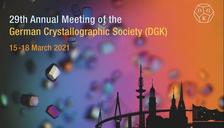The online Annual Conference of the German Crystallographic Society '29. Jahrestagung der Deutschen Gesellschaft für Kristallographie - DGK 2021' took place from 15-18 March 2021 and was organised by DESY in Hamburg.
The 'Book of Abstracts' (Tagungsband) of the DGK 2021 was published as a supplement to the 'Zeitschrift für Kristallographie', Vol. 41 (2021), DOI: 10.1515/9783110740172.
The DGK conference is held annually by the German Crystallographic Society - the Deutschen Gesellschaft für Kristallographie. A very high number of more than 600 participants, mainly from Germany, but also from 20 other countries, registered for this years’ conference which took place online for the first time from 15-18 March 2021. The original plans were to welcome the participants by the organising institution DESY in Hamburg (Germany). However, due to the on-going Covid-19 pandemic a re-organisation of the whole event in close collaboration with the DGK ‘Arbeitskreise’ (AKs) as an online format was required.
The online DGK 2021 conference featured a lively exchange within over 25 sessions with 80 talks across the many fields of science that are conducted in the research field of crystallography. During the session for young crystallographers everybody got a chance to present latest results in a lightning talk and at the poster sessions. The conference was accompanied by two poster sessions with over 50 posters in total. Participants joined in to listen to online talks and to poster presenters on e.g. bio-crystallography, inorganic crystal structures and functional materials, organic and metal-organic crystal structures, energy materials, like batteries and photovoltaics, as well as disordered or complex crystal material and different advanced techniques.
During a special session, the winners of the Max von Laue prize 2020 in the area of crystallography and applications, Tobias Beck (Universität Hamburg) for his work on ‘Self-organization of biomolecular building blocks and inorganic nanoparticles into biohybrid nanomaterials’, and Matthias Zschornak (TU Bergakademie Freiberg and TU Chemnitz) for his work on ‘From the perturbation of crystal symmetry towards functionality’, gave their award talks.






